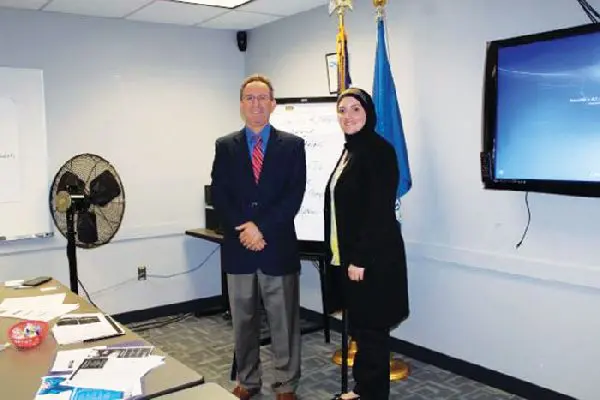
DEARBORN – The American Arab Anti Discrimination Committee of Michigan (ADC-MI) held a cultural competency training seminar with the Transportation Security Administration (TSA) this week in anticipation of increased travel by Arab and Muslim Americans over the summer months.
ADC-MI organized the training session as a means of working actively to ensure that all Arab-Americans and their families have their rights protected while traveling.
ADC-MI Director Fatina Abdrabboh led the closed door sessions attended by homeland security leaders from across the nation in order the address cultural sensitivities often overlooked by TSA agents when Arabs and Muslims travel, both domestically and internationally.
The TSA, an agency of the U.S. Department of Homeland Security, has authority over the security of the traveling public in the U.S.
“The Department Of Homeland Security is a very important arm in the safety of our country,” Abdrabboh told The Arab American News. “But civil rights and liberties of travelers can’t just be thrown out the window.”
Abdrabboh created the cultural competency training curriculum in response to the documented need for increased cultural competence among various corporate and nonprofit institutions in the metro Detroit area.
The training sessions are also a response to the influx of complaints ADC-MI has received from Muslims and Arabs who were subjected to mistreatment at national airports.
The seminar aimed to educate agents on cultural sensitivities as well as answer burning questions they might have had about Islamic traditions and customs.
“They asked all the uncomfortable questions in a comfortable setting,” Abdrabboh added. “Americans are curious about political questions that they can’t get answered. It’s important to educate them on our community when all these issues are brought up. The goal is to let them know we take these complaints seriously.”
Among the training items included the sensitivities of interacting with a woman who wears the hijab. TSA agents also stated that some Muslim travelers get offended if they were to put a Quran through an X-ray machine.
“There are steps they can take to be more delicate about certain situations,” Abdrabboh added.
Abdrabboh said she gave those at the training sessions an opportunity to use her as a “prop”, since she is a Muslim woman who wears a headscarf and often travels across the country.
“I symbolized a Muslim mom walking through the airport,” Abdrabboh said. “You don’t have to be a foreigner to care about privacy and a pat down and not wanting to expose yourself. All Arab American Muslim women have similar concerns.”
The sessions also attempted to inform the agents of the mindset of a typical Arab American or Muslim American as they travel through national airports. Many of them have fears of being stereotyped or pre-judged even before coming in contact with the TSA, due to the constant negative perception of the religion and culture in the mainstream media.
“They are walking through terminals with CNN blasting in the background,” Abdrabboh said. “I tried to present the psyche of the Arab and Muslim traveler before they even have a first word with TSA.”
The two training seminars appeared to have been so well received by the TSA that more sessions are being planned for the future. Abdrabboh will be traveling to Washington D.C. in August to hold another seminar with leaders there.
Abdrabboh said she hopes these programs will improve the travel experience for Arab Americans and Muslim Americans while simultaneously ensuring that government agencies provide individualized care that would lead to improvements in quality and safety of the traveler.
She also hopes TSA agents are more welcoming and respectful towards the use of inclusive language and behaviors, as opposed to viewing it as threatening and isolating. She noted that for the TSA to undergo such cultural competency training is also good for overall business.
“Cultural sensitivity makes good financial sense,” Abdrabboh said. “The bottom line is customer satisfaction is key anywhere. It makes financial sense to be culturally in tune with your client base.”






Leave a Reply